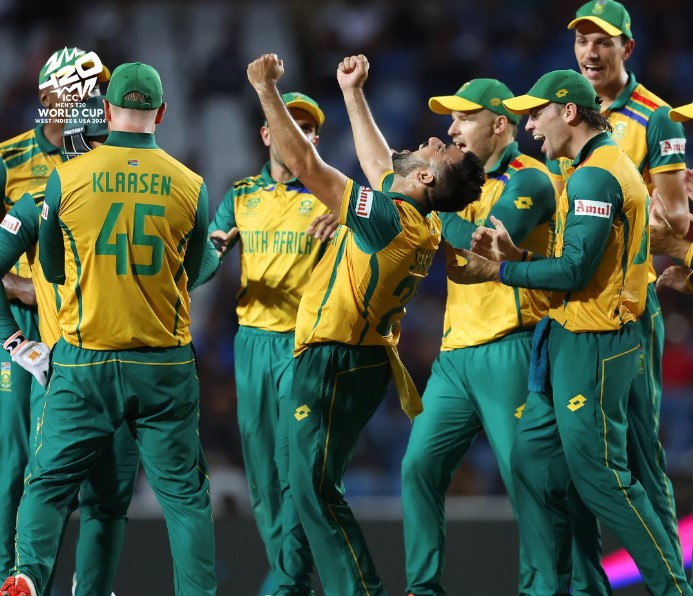The Proteas have ended their run of semi-final heartache by beating Afghanistan to reach their first men’s T20 World Cup final.
The South African men’s cricket team had failed to make it past a semi-final in all seven of their previous World Cups across formats.
They now progress to Saturday’s final in Barbados as they look to win a World Cup for the first time.
They will play England or India, who meet in the second semi-final in Guyana today (Thursday).
Marco Jansen and Kagiso Rabada demolished Afghanistan’s top order, as they folded for just 56, their lowest total ever in a T20 International.
A history of World Cup heartache for the Proteas
For decades the Proteas has been a dominant force in the international cricket arena, but despite their undeniable talent and periodic flashes of brilliance, the Proteas have been unable to shake off the label of “nearly men” of world cricket, falling short of reaching a final in any major ICC tournament.
It was the 1992 Cricket World Cup that saw the Proteas make a significant mark, only to experience the first of many heartbreaks.
In a rain-affected semi-final against England, the Proteas were given the impossible task of scoring 22 runs off just one ball due to a controversial rain rule. This early exit set the tone for the team’s future in ICC tournaments.
The 1999 Cricket World Cup in England saw the Proteas in scintillating form. With a squad brimming with talent, they stormed through to the semi-finals, facing Australia in a match that has since become legendary.
In a dramatic tie, due to a misunderstanding between Lance Klusener and Allan Donald, the Proteas fell short of advancing to the final based on their earlier loss to Australia in the Super Six stage.
The image of Donald stranded mid-pitch, bat in hand, remains one of the most poignant moments in cricket history.
The 2007 World Cup in the West Indies was another painful chapter. After dominating the group stages, the Proteas faced Australia again in the semi-finals. A dismal batting collapse saw them bundled out for a mere 149 runs, which Australia chased down with ease.
In 2015, co-hosted by Australia and New Zealand, South Africa seemed poised to finally break their semi-final jinx. In a rain-affected match against New Zealand, Grant Elliott’s last-over heroics dashed South African hopes once more. The sight of AB de Villiers and Morne Morkel in tears epitomized the nation’s heartbreak.
The Champions Trophy: Close Yet So Far
The ICC Champions Trophy has also seen South Africa come tantalizingly close. The 1998 edition saw them reach the semi-finals, only to lose to West Indies.
In 2002, a tie with Sri Lanka in the semi-final due to rain meant another exit. The 2013 and 2017 editions were no different, with semi-final exits continuing the trend.
T20 World Cup Woes
The shorter format has not been kinder to the Proteas. In the inaugural 2007 T20 World Cup, they failed to progress past the Super 8 stage.
The 2014 and 2016 editions saw them reach the semi-finals, only to falter at crucial moments.
Their progression to the T20 World Cup final in 2024 is testament to the continued tenacity of the Proteas, and that’s no choke!
South Africans have been expressing their jubilation at the historic win on social media.
We have lived to see this day. 32 years after playing in our first ever world cup, the Proteas are in a final #ProteaFire
— Altaaf Kazi (@AK_MediaMan) June 27, 2024
THATS IT!!!! #ProteasWin
Proteas have beaten Afghanistan by 9 wickets and will face either India or England in Sundays final
Afghanistan was 56 all out
Jansen and Shamsi with 3 wickets eachSA chased that down in 8.5 overs
Hendricks made 29
Markram made 23 #ProteaFire— Cindy Poluta (@CindyPoluta) June 27, 2024
CHAMPIONS! WE ARE IN THE FINAL! SMASHED IT!
#ProteaFire #T20WorldCup
— Rory Petzer (@RoryPetzer) June 27, 2024
A Saturday night to look forward to boys, our first Cricket Men’s World Cup final since returning to international sport 32 years ago.
#T20WorldCup2024 | #ProteaFire pic.twitter.com/mUpoMU4BhA
— Velile Mnyandu
(@Velile_Mnyandu) June 27, 2024
SEMI-FINAL RESULT | #SAVAFG
A tale of aspiration & inspiration continues
South Africa prevail in style and win by 9 wickets!
See you in the Final
#WozaNawe #BePartOfIt#OutOfThisWorld #T20WorldCup pic.twitter.com/McA3knHhY5
— Proteas Men (@ProteasMenCSA) June 27, 2024







